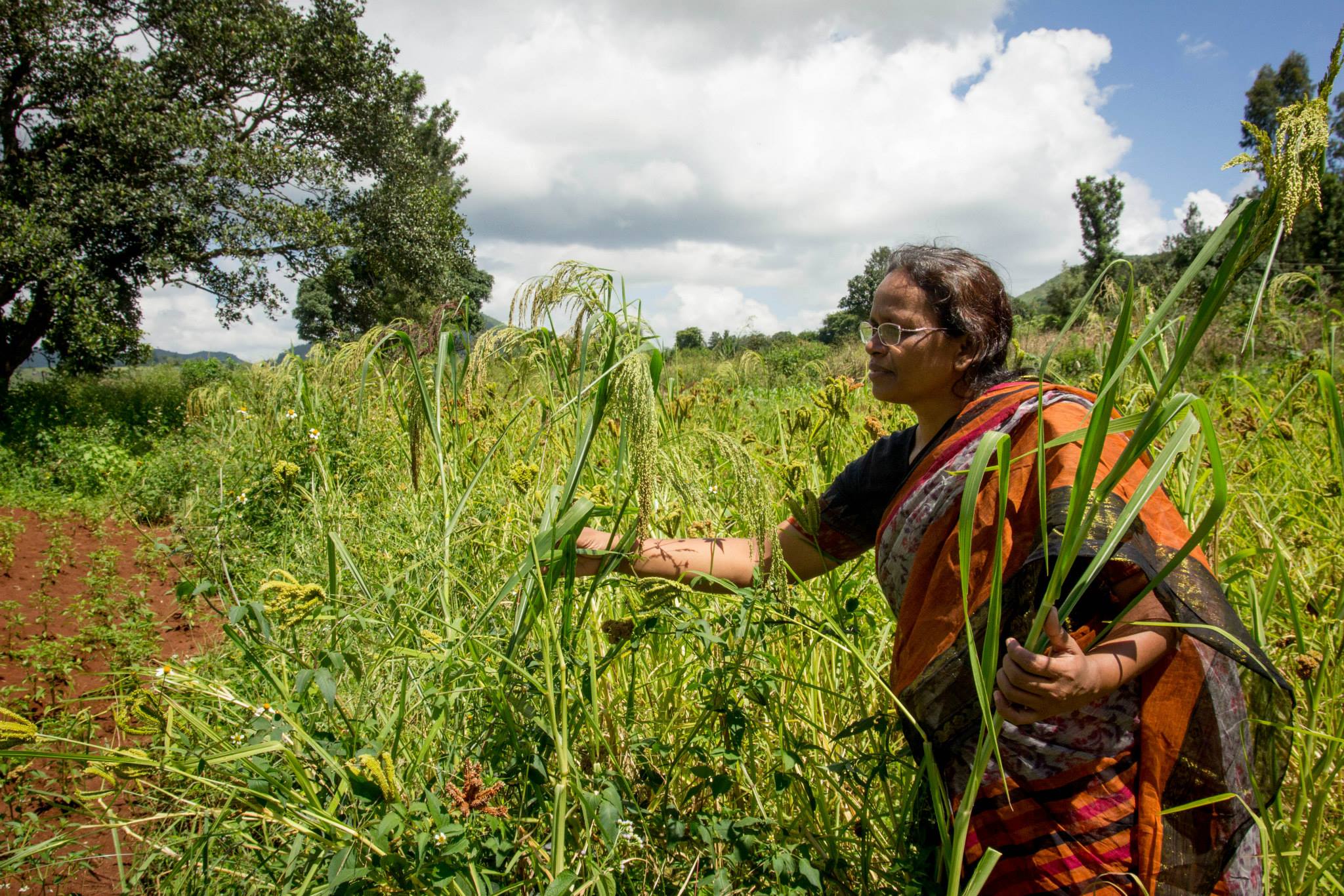By Salome Yesudas, Coordinator Chethana, Joining Hands India

Salome Yesudas, the new coordinator of Joining Hands India, harvests millet. Photo courtesy of Salome Yesudas.
I joined Chethana, the Joining Hands network in South India, as its Coordinator, on August 1, 2015. With a postgraduate degree in Food and Nutrition, my interest in local food and agriculture systems provided me wonderful opportunities to learn and unlearn how local food systems work.
My Husband’s Grandmother and my mother-in-law were experts in selecting, saving and distributing seeds to fellow farmers. It provided them with not only additional cash but also a sense of dignity and self-reliance. They both enriched my understanding of seeds, local systems and the importance of crop diversity. My interactions with women farmers as part of my job, as well as in-house discussions helped me a great deal in learning how local food and agricultural systems work in traditional rural communities and how important they are for food and nutrition security.
Zaheerabad is a rain-fed dry land area, known for its millet cultivation. Farming practices of farmers in that region are rooted in mixed or multi ple cropping, planting more than one crop on a plot of land during one season. One can find millets, pulses, oilseeds, and vegetables growing next to each other. This crop combination and diversity makes it possible for people in a dry land to eat nutritious meals without needing to buy food from outside.
Besides this ecologically sound farming practice, I was also impressed by the crucial role played by ‘uncultivated foods,’ wild greens or weeds, in the nutritional health of the people in the region. Uncultivated foods play an important role in the food and nutrition security of traditional rural communities due to their affordability and availability of micronutrients essential for health, especially women’s and children’s health.
While working as a coordinator for a South Indian network called South Against Genetic Engineering years ago, I came to understand our responsibility to protect the vulnerable dry land cropping systems from monocrop agriculture and genetically modified organisms (GMOs). This work led me to learn about Chethana and its work to save traditional seeds, especially minor millets, as well as its campaign against seed monopolies like Monsanto.
Chethana broadened my perspective, helping me to understand the importance of saving native seeds while simultaneously addressing related concerns of biodiversity, agro-ecology, food safety, environmental health, and improving policies that ensure food, nutrition and livelihood security of small and marginal farming communities. By saving native seeds and making them available to farmers, we defy the logic of seed and agribusiness corporations and strengthen the self-reliance of farming communities so that they can lead healthy lives.
Working with Chethana gives me enormous satisfaction in that now I can integrate my faith and my work. My faith informs me that, “The earth is the LORD’s, and everything in it, the world, and all who live in it” (Psalm 21: 1). It teaches me that as human beings we have a duty to be good stewards of the earth, its rich diversity and delicate relationships in which life is sustained. This stewardship extends to humans; the prayer, “Give us this day our daily bread” is meaningful only when we work to remove hunger and poverty from the world.
We need to join hands with people from the east and west, north and south, so that we can turn the prayer, a prayer that we often recite without caring for its meaning, “thy Kingdom come,” into a prayer of action.
![]() You may freely reuse and distribute this article in its entirety for non-commercial purposes in any medium. Please include author attribution, photography credits, and a link to the original article. This work is licensed under a Creative Commons Attribution-NonCommercial-NoDeratives 4.0 International License.
You may freely reuse and distribute this article in its entirety for non-commercial purposes in any medium. Please include author attribution, photography credits, and a link to the original article. This work is licensed under a Creative Commons Attribution-NonCommercial-NoDeratives 4.0 International License.
Categories: Hunger & Poverty
Tags: food, hunger, India, Joining Hands, presbyterian hunger program
Ministries: Joining Hands, Presbyterian Hunger Program